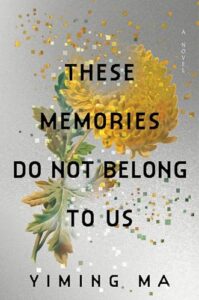
This review is based on an eARC (Advance Reading Copy) provided by the publisher via NetGalley in exchange for an honest review. These Memories Do Not Belong to Us was released on August 12, 2025.
Over the past year or so, I’ve noticed myself immensely enjoying stories that play with memory in interesting ways. So while author Yiming Ma and publisher Mariner Books were unfamiliar to me, the premise of These Memories Do Not Belong to Us was sufficiently intriguing for me to give it a try.
These Memories Do Not Belong to Us is described by the author as a constellation novel, consisting of eleven stories mostly linked by setting, though with a few overlapping characters here and there. The setting is a future one where China has become the dominant world power, destroying Japan entirely and colonizing the United States. They have developed technology that allows memories to be stored and experienced by others, and the eleven stories all come from an illicit cache of memory dramas hoarded by the narrator’s mother. Some stories take place before the conquest, some in its immediate aftermath, and others far into the future, in a world where the state is able to monitor even its citizen’s minds to snuff out sedition.
If there’s a thread linking the eleven stories, it’s one of resistance. Often that’s resistance to the rules of an authoritarian empire, but even in the stories that take place before the Party came into the full height of its powers, there are opportunities to push against oppressive social norms—often ones that indeed calcify into hardened rules by the period of the later stories. There are several instances of stories recorded as having been widely celebrated for their daring in their own day that have become verboten by the narrator’s time, hammering home the Party’s diachronic inconsistency as it continually tightens the noose on those deemed unworthy.
In the individual stories, those themes often come out in somewhat odd structural ways. I quote Bora-Chung-quoting-Boris-Eikhenbaum saying “in a short story, the ending is the climax” often enough to be intimately familiar with the structural differences between a short story and a novel, but in the stories that constitute These Memories Do Not Belong to Us, the feeling of incompleteness is stronger than usual. In keeping with much of short fiction, they commonly end on the making of a decision or the completion of a task, without delving into the long-term consequences. The strangeness lies in their tendency not to dwell on the short-term consequences either. Some stories end in the middle of a scene, leaving the reader unsure exactly what to take from them. There’s a sense in which this ambiguity serves the conceit of many of the stories as formerly licit but now interpreted as subversive, and there is an extent to which the framing of the stories weaves a tapestry greater than each individual piece. But at the same time, so many ambiguous or unsatisfying endings in a row makes for some difficulty in following the throughline. Yes, many of the pieces involve resistance of some sort. So what? Is it a model to follow or just a collection of episodes that proved trivial on the grand line of history?
Of course, resistance being ineffective does not mean it isn’t worth doing, and there are some instances in which the stories do bring out the ways in which it has changed lives. Probably my favorite of the constituent stories is the pandemic tale “After the Bloom,” which develops a heartwarming mentorship dynamic and features a few tidbits that give the reader insight into the knock-on effects of previous tales. It’s in instances like these where it’s easy to see the vision for a powerful novel in stories.
But by and large, those moments are few and far between. Which doesn’t mean that These Memories Do Not Belong to Us has nothing to recommend it. The depiction of authoritarian power is chilling, and the individual stories are written at a high enough level to keep the reader’s interest, even if they don’t have the sort of endings that elevate what came before. But the frequency of that feeling of incompleteness does give me some mixed feelings about the enterprise on the whole.
Ultimately, These Memories Do Not Belong to Us is a novel in stories that compels with its storytelling and worldbuilding, but a tendency to end the stories just a little bit too early to be emotionally satisfying dampens the impact to some extent. The stories are better together than they are apart, but it’s also not a book meaning to wow readers with a big moment of convergence. Instead, this is one for fans of mosaic novels who don’t mind dwelling in ambiguity.
Recommended if you like: mosaic novels, anti-authoritarian cautionary tales.
Can I use it for Bingo? It’s hard mode for Published in 2025, and I’d argue Five Short Stories as well. It also has a POC Author.
Overall rating: 13 of Tar Vol’s 20. Three stars on Goodreads.
